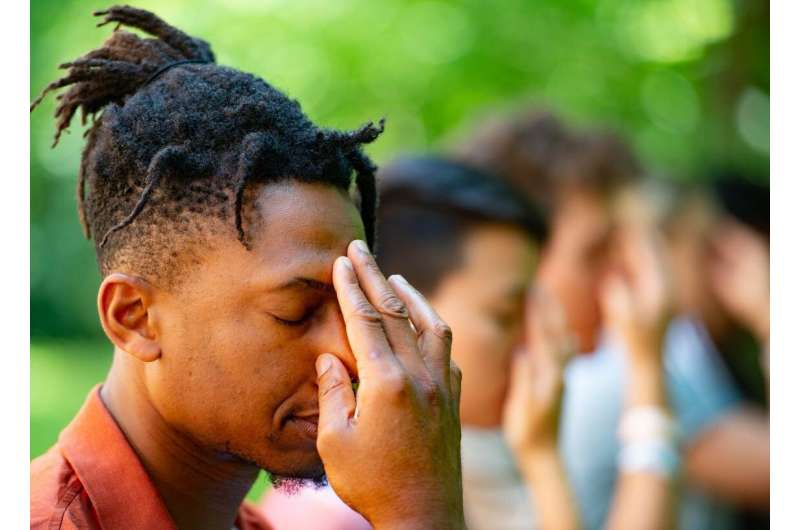Yogic breathing improves students' response to stress

University students are uniquely vulnerable to stress—both psychological and physiological. In addition to academic and financial demands, pursuing higher education often means leaving home and building new social networks.
Campuses are increasingly offering wellness workshops to help young adults manage their stress, but few rigorously controlled studies exist to help determine best practices.
A new study led by University of Arizona alumnus Michael R. Goldstein, a research fellow in the Department of Neurology at Beth Israel Deaconess Medical Center in Boston, helps fill that gap.
Goldstein conducted the research as a doctoral student in clinical psychology at UArizona. He and his co-authors—including his adviser John Allen, a University Distinguished Professor of Psychology in the UArizona Department of Psychology—studied two life skills workshops designed to teach university students to cope with stress.
They found that the program that focused on yogic breathing—a meditative practice that involves slow and fast patterns of breath—improved participants' ability to cope with stress, as measured by both self-report and heart rate data, compared to a workshop that focused on cognitive approaches to stress. The findings appear in the Journal of American College Health.
"Due to the many challenges and transitions associated with life as a student, coping strategies become paramount in supporting young adults' health, developmental growth and social relationships," Goldstein said. "We investigated the effects of workshops with contrasting approaches to stress management, and while both were popular with participants, the one that incorporated yogic breathing demonstrated benefits that were stronger, longer-lasting, and evident across more measures of wellness than the cognitive comparison workshop."
The researchers recruited 108 undergraduate and graduate students and sorted them into one of the two campus-based wellness workshops. The SKY Campus Happiness program is an existing four-day, 18-hour program that focuses on yogic breathing techniques and social connectedness to enhance stress management. The Wisdom on Wellness program, created specifically for the study to serve as a comparison to SKY, used similar course design and materials but emphasized cognitive approaches to stress management and did not include meditative yogic breathing.
Participants were asked to complete online questionnaires immediately before and after the four-day workshops, then three months later. With validated questionnaires, participants were asked to reflect on their perceived stress levels, sleep quality, social connectedness, satisfaction with life and more. Physiological data, including heart and respiration rates, were also collected.
While both workshops were rated favorably, with all participants citing improvements in their feelings of social connectedness, only participants in the SKY program reported significant decreases in perceived stress levels, sleep disturbances and a number of other measures of well-being.
"Effectively managing the stresses of college has important implications for physical and mental health, and mastering stress management skills during early adulthood may be especially important in buffering individuals from stresses as they progress through life," said Allen, who co-authored the paper with Goldstein and Rivian K. Lewin of the University of Memphis. "The intervention tested in this study was comprehensive in scope but also easily implemented and well-received by the participants. The results highlight again the importance of social connectedness—something that we may all need to work to maintain during these times of greater physical distancing."
Physiological data revealed both groups saw improvement in heart rate as a cardiac measure of stress during and after laboratory experiments to include a physiological stress response. However, only participants in the SKY program appeared to develop resiliency against anticipatory stress.
"When we anticipate a stressful situation, our breathing and heart rates naturally go up," Goldstein said. "In this study, we observed that pattern for the cognitive group, but the yogic breathing group seemed to show protection against that type of stress. Their heart rate increased only slightly when they knew a stressful situation was coming."
The researchers suggest their findings may be of use to campus health providers and university administrators seeking to provide young adults with the coping skills necessary to succeed.
"College students are a valuable target for interventions aiming to enhance stress management and wellness, given they are learning habits with long-term implications for their health and wellness," Goldstein said. "The SKY workshop likely has several active ingredients that contributed to the positive effects we demonstrated. Future research to disentangle these components to evaluate their relative contributions is needed."
More information: Michael R. Goldstein et al. Improvements in well-being and cardiac metrics of stress following a yogic breathing workshop: Randomized controlled trial with active comparison, Journal of American College Health (2020). DOI: 10.1080/07448481.2020.1781867

















